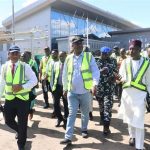
*NCAA: Nigerian Airlines can Fly to US with Leased Aircraft
*Delisting not due to Safety Concerns
*Arik Air Audited for Nigeria’s Cat 1 Status Reacts
Nigeria has been delisted from the United States Federal Aviation Administration Category One Status (USFAA CAT 1) International Aviation Safety Assessment Programme (IASA).
Nigeria was delisted because no Nigerian registered airline has operated to the US for about seven years and according to the new FAA regulation, a Category One status country that failed to operate to US after two years will be delisted from the status.
This indicates that no Nigerian registered carrier can operate to any US destinations until Nigeria returns to the status.
Category One Safety Status means that the country certified by the status has met US safety standard to operate flights to the US, which includes compliance to the International Civil Aviation Organisation (ICAO) standards.
To designate and certify a country worthy of Category 1 Status, FAA inspectors will assess the country’s civil aviation authority and determine that it licenses and oversees air carriers in accordance with ICAO aviation safety standards.
The air carriers (airlines) from the assessed state may initiate or continue service to the United States in a normal manner and take part in reciprocal code-share arrangements with US carriers, as long as that country maintains the safety standard that earned it the certification.
Nigeria gained the USFAA CAT 1 Status in August 2010 after a rigorous exercise that spanned about five years, but due to the failure of any Nigerian airline to operate directly to the US for seven years, the country was delisted.
Also, the FAA’s International Air Safety Assessment (IASA) programme determines whether a country and its airlines will be allowed to fly into the US.
Reacting to the report, the Director General of the Nigeria Civil Aviation Authority (NCAA), Captain Chris Najomo, in a statement explained that the decision taken by USFAA has nothing to do with safety.
“To operate into the United States of America, Nigeria like most countries must satisfactorily pass the International Aviation Safety Assessment (IASA) Programme and attain Category 1 status. Upon attaining this status, Nigerian airlines would be permitted to operate Nigerian registered aircraft and dry-leased foreign registered aircraft into the United States, in line with the existing Bilateral Air Services Agreement (BASA).
“The first time Nigeria attained Category One Status was in August 2010. The U.S. Federal Aviation Administration (FAA) conducted another safety assessment on Nigeria in 2014. A further safety assessment was conducted on Nigeria in 2017, after which Nigeria retained her Category One status.
However, with effect from September, 2022, the U.S. Federal Aviation Administration (FAA) de-listed Category One countries who, after a two-year period, had no indigenous operator provide service to the U.S. or carrying the airline code of a U.S operator. Also removed from the Category One list were countries who the FAA was not providing technical assistance to base on identified areas of non-compliance to international standards for safety oversight,” NCAA said.
It also stated that no Nigerian operator has provided service into the United States using a Nigerian registered aircraft within the two-year period preceding September, 2022 so it was expected that Nigeria would be de-listed as were other countries who fell within this category. Nigeria was, therefore, de-listed since 2022 and was duly informed of this action in 2022.
“It is important to clarify here that the de-listing of Nigeria has absolutely nothing to do with any safety or security deficiency in our oversight system. Nigeria has undergone comprehensive ICAO Safety and Security Audits and recorded no Significant Safety Concern (SSC) or Significant Security Concern (SSeC) respectively.
“It is furthermore necessary to add that a Nigerian operator can still operate into the US using an aircraft wet-leased from a country who has a current Category One status,” the Director General said.
According to him, NCAA continues to adhere strictly to international safety and security standards and respects the sovereignty of States, including the United States of America, as enshrined in Article One of the Convention on International Civil Aviation. This provision gives States complete and exclusive sovereignty over the airspace above their territories.
“Furthermore, it is in full realisation of this situation that has since prompted the Honourable Minister of Aviation and Aerospace Development, Olorogun Festus Keyamo, SAN, to embark on an aggressive international campaign to empower our local operators to access the dry-lease market around the world which culminated in the visit to Airbus in France earlier this year and the MOU signed with Boeing in Seattle, Washington just last week. The Honourable Minister has also done a lot of work to make Nigeria comply fully with the Cape Town Convention which will bring back the confidence of international lessors in the Nigerian aviation market. We are confident that with these steps of the Honourable Minister, it is only a matter of time that Nigeria, not only regains, but can sustain its US Category One status,” NCAA also said.
Also, reacting to the delisting of Nigeria from by the USFAA Category 1 status, shareholders of Arik Air recalled how FAA inspectors audited the airline and used it to rate Nigeria, saying that the takeover of the airline downgraded the airline industry, hence the delisting of Nigeria by the USFAA.

“It should be noted that Arik Air invested in the rigorous and painstaking audit and certification programmes that resulted in the Cat 1 certification for Nigeria and Nigerian air operators in collaboration with the Nigerian Civil Aviation Authority (NCAA), Federal Airports Authority of Nigeria (FAAN) and the Ministry of Aviation and Arik Air between 2009 and 2010.
“To achieve this, Arik Air made direct investments of over $12M dollars in engaging a world class consultant, SH&E from USA to develop manuals, procedures, supervise and facilitate the implementation of the Cat 1 certification process. SH&E USA assisted the Nigerian civil aviation authorities and Arik Air, to train several professionals to achieve the USFAA Cat 1 certification for Nigeria and airline operators in Nigeria between 2009/2010. During this process, several flights, safety and operations professionals of Arik Air, NCAA and FAAN were trained and certified by USFAA, this is in addition to their respective NCAA certifications. Also, the entire check-in, boarding, security of Nigerian main airports (Lagos/Kano, Abuja & Port Harcourt) related operation support for airlines were enhanced as recommended by the Consultants and approved by FAA,” the Arik Air shareholders disclosed.
They also stated that it is important to acknowledge the tireless efforts of Mrs. Fidelia Njeze, former Minister of Aviation, Dr Harold Demuren, former Director General of NCAA, Dr Richard Aisuebeogun, former Managing Director of Federal Airports Authority Nigeria & the Managing Director Nigerian Airspace Management Agency at the time in ensuring the delivery and success of the Cat 1 audit and certification process.
The shareholders recalled that while attesting to the commitment of Arik Air to aviation development in Nigeria, Dr. Harold Demuren, the then DG NCAA in 2010 explained to newsmen at a press conference of August 15, 2010, in Zaria that Arik Air deployed its newly acquired A340-500 aircraft to fly to Lagos/London-Heathrow/Lagos and Lagos/JFK/Lagos with FAA, NCAA, British Civil Aviation Authority(BCAA) and SH&E(USA) Inspectors and officials for 50 hours without passengers on board and did it successfully to demonstrate its capacity to respond to FAA and NCAA requirements.
According to Dr Demuren, “Arik Air demonstration of the core competence to operate long haul flights seamlessly is one of the final requirements for the regulatory agency, NCAA, to attain Cat 1 certification.”
Dr. Demuren assured Nigerians then that the nation would attain to celebrate the country’s 50th independence (and it did!). This is aside from the direct and indirect monetary and goodwill investment in this exercise which Arik Air invested in as a national service
The Arik Air shareholders said, “It is regrettable and painful that the reports that Nigeria has been delisted from the USFAA Cat 1 certification listing due to inactivity of a Nigerian operator on the American route among other requirements is now the headlines in the media. This inactivity of a Nigerian operator is as a result of the forceful take-over and discontinuation of the long-haul flights of the Arik Air operations by the Assets Management Corporation of Nigeria on 9 February 2017.
“AMCON after taking over Arik Air announced the discontinuation of the Lagos /New York -JFK/ Lagos Flights ; a service that was initially operated on behalf of Arik by Hi Fly of Portugal to meet the Part 129 requirement for operators from Nigeria at the time, Until Nigeria obtained the Cat 1 status and Arik Air obtained its Part 129 certification, Arik Air took over the Lagos/New York /Lagos operations with its Nigerian registered aircraft and crew and operated successfully for over six years before AMCON forcefully took over the airline.”
Since Arik Air stopped flights to the US in 2017, no registered Nigerian carrier has started operation to any destination in the US.






